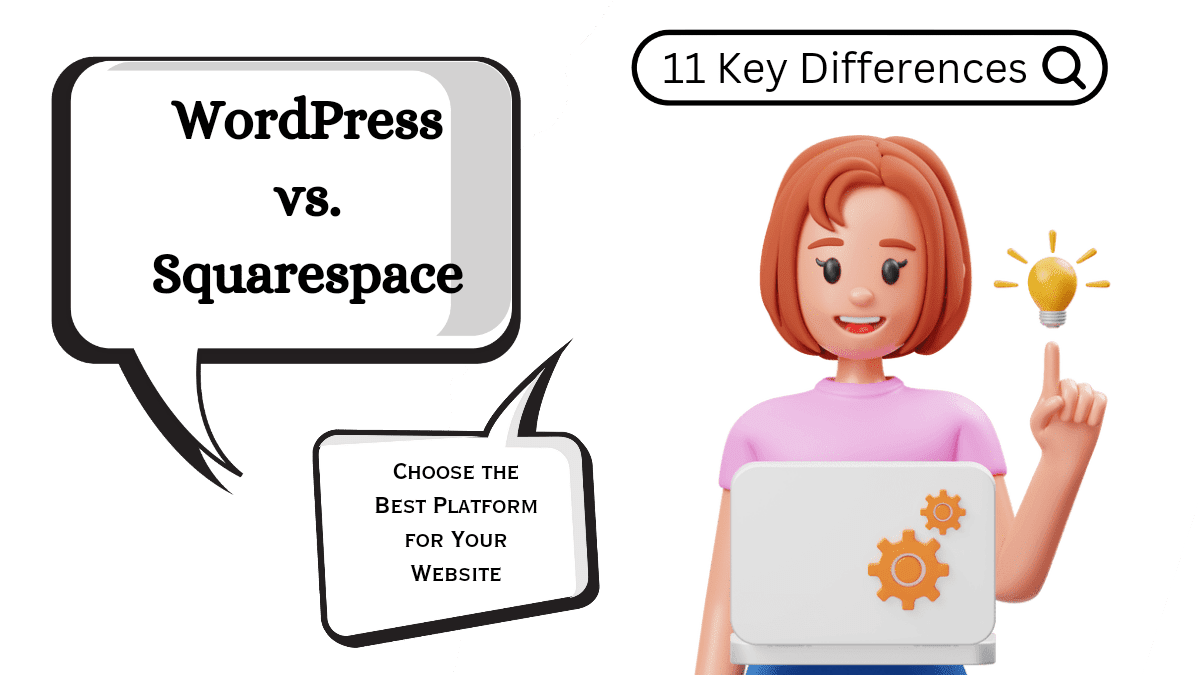Selecting the appropriate platform for your website is essential to its success. WordPress and Squarespace are two popular choices, each with its strengths and suitability for different needs. In this comprehensive comparison, we’ll delve into WordPress vs Squarespace, exploring aspects like ease of use, customization options, SEO capabilities, e-commerce functionalities, blogging capabilities, customer support, performance, security measures, mobile responsiveness, and more. Additionally, we’ll provide expert recommendations to help you make an informed decision based on your specific requirements and goals.
WordPress
WordPress is a powerhouse content management system (CMS), dominating over 40% of the web. It offers an extensive library of themes, plugins, and customization options, catering to beginners and advanced users alike.
Pros of WordPress:
- Extensive customization options
- Wide range of themes and plugins
- Strong SEO capabilities
- Scalability for growing websites
- Active community support
Cons of WordPress
- Requires regular updates and maintenance
- Initial learning curve for beginners
- Security vulnerabilities without proper precautions
Squarespace
Squarespace, on the other hand, is a user-friendly website builder known for its sleek templates and intuitive interface. It’s popular among small businesses, artists, and bloggers who prioritize aesthetics and ease of use.
Pros of Squarespace:
- Beautiful and responsive templates
- Drag-and-drop editor for easy customization
- All-in-one platform with hosting included
- Suitable for beginners without technical skills
- Integrated analytics and marketing tools
Cons of Squarespace:
- Limited third-party integrations compared to WordPress
- Less flexibility for advanced customizations
- Higher cost for e-commerce features
Related Post: The Great Debate- Drupal vs WordPress: 11 Key Differences That Can Transform Your Website Strategy!
WordPress vs Squarespace: Key Differences
Cost:
WordPress offers a range of pricing options, including free (self-hosted) to premium plans with additional costs for hosting, domain registration, themes, and plugins. Squarespace, on the other hand, has fixed monthly pricing including hosting and domain, simplifying cost management for users.
Ease of Use:
WordPress requires a learning curve due to its vast array of customization options. In contrast, Squarespace offers a more intuitive drag-and-drop interface, making it accessible even to beginners.
Customization Options:
WordPress provides extensive customization through plugins and themes, whereas Squarespace offers limited but visually appealing templates.
SEO Capabilities:
WordPress comes with robust SEO plugins like Yoast SEO and Rank Math, offering comprehensive optimization features. Squarespace also has built-in SEO tools but with fewer customization options. WordPress’s plugin ecosystem allows for advanced SEO strategies, giving it an edge over Squarespace in SEO flexibility.
E-commerce Functionality:
Squarespace offers integrated e-commerce features like product listings, checkout, and inventory management. WordPress requires plugins like WooCommerce for similar functionalities. However, both platforms integrate with payment gateways, but Squarespace streamlines the process within its platform.
Content Management:
WordPress excels in content management for blogs, with categories, tags, and scheduling. Squarespace offers basic blogging features.
Customer Support:
Squarespace provides 24/7 customer support via chat and email, whereas WordPress support depends on hosting and plugins.
Performance and Speed:
WordPress performance varies based on hosting providers, while Squarespace ensures consistent performance with managed hosting.
Load Times:
Squarespace optimizes load times for its templates, but WordPress sites can achieve similar speeds with optimization techniques.
Security Measures:
Without proper security precautions, WordPress’s open-source nature can result in vulnerabilities. Squarespace manages security but with limited control. Both platforms regularly update security patches, but WordPress requires manual updates for plugins and themes.
Mobile Responsiveness:
Squarespace templates are inherently mobile-responsive, providing a seamless user experience across devices. WordPress requires responsive themes or customization.
Related Post: The Great Debate- Drupal vs WordPress: 11 Key Differences That Can Transform Your Website Strategy!
WordPress vs Squarespace –Expert Recommendations
Experts recommend considering specific needs when choosing between WordPress and Squarespace:
- WordPress excels for serious bloggers, offering advanced tools. Squarespace is suitable for basic blogging needs.
- Squarespace is beginner-friendly, whereas WordPress offers scalability and customization for those with technical proficiency.
- WordPress offers more SEO control through plugins, while Squarespace’s built-in tools are simpler.
- Squarespace’s templates are visually appealing and great for portfolios. WordPress can also work well with the right themes.
- For e-commerce needs, Squarespace is suitable for smaller stores, while WordPress with WooCommerce is ideal for larger setups requiring customization.
- Consider your long-term goals and technical expertise when choosing between the two platforms.
Conclusion
In the WordPress vs Squarespace conclusion, both WordPress and Squarespace have their strengths and weaknesses. If you prioritize flexibility, customization, and scalability, WordPress is the way to go. On the other hand, if you value simplicity, aesthetics, and an all-in-one solution, Squarespace might be the better choice.
Evaluate your specific needs, budget, and technical expertise before making a decision. Ultimately, the best platform for your website depends on your unique requirements and long-term goals.
FAQs
Which platform is better for blogging?
WordPress offers advanced blogging capabilities with SEO plugins and content management tools.
Can I switch from Squarespace to WordPress?
Yes, you can migrate your website from Squarespace to WordPress with proper planning.
Is Squarespace more beginner-friendly than WordPress?
Squarespace’s intuitive interface makes it easier for beginners, but WordPress offers more control.
Does Squarespace provide hosting?
Yes, Squarespace includes hosting in its plans.
Can I sell products on WordPress?
Yes, with plugins like WooCommerce, WordPress supports e-commerce functionalities.
Which platform is suitable for portfolio websites?
Squarespace’s templates are ideal for portfolios due to their visual appeal.

